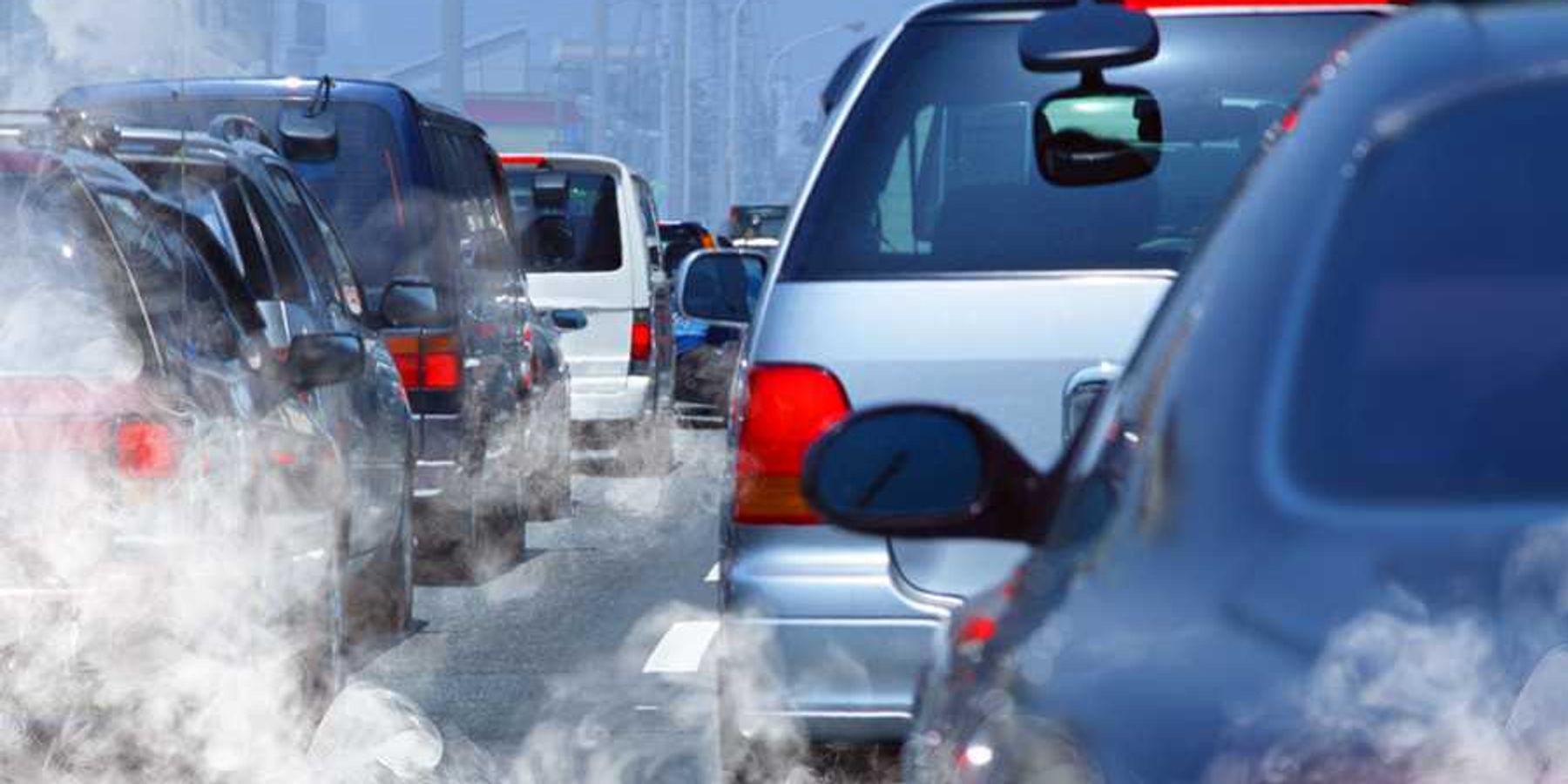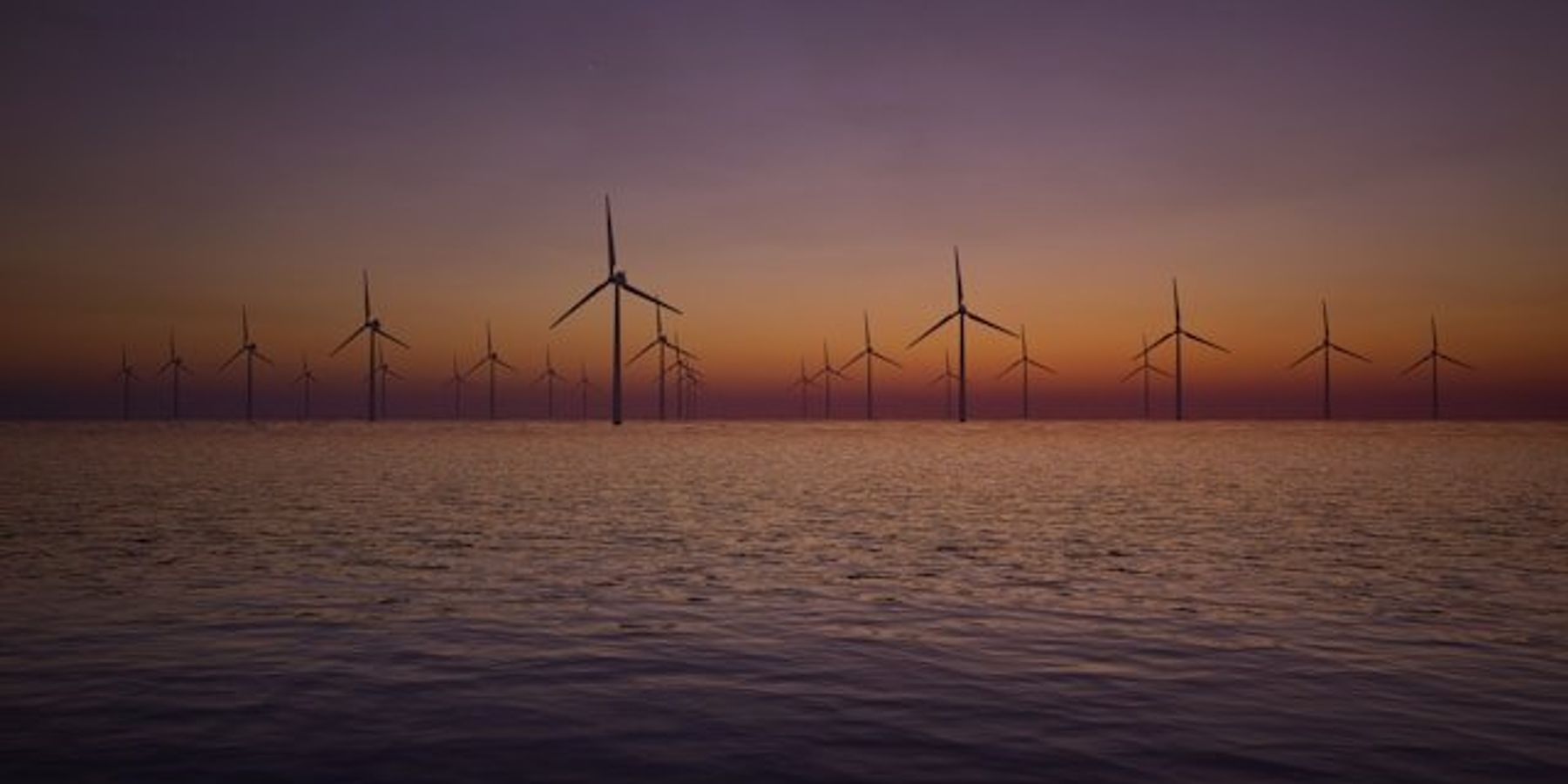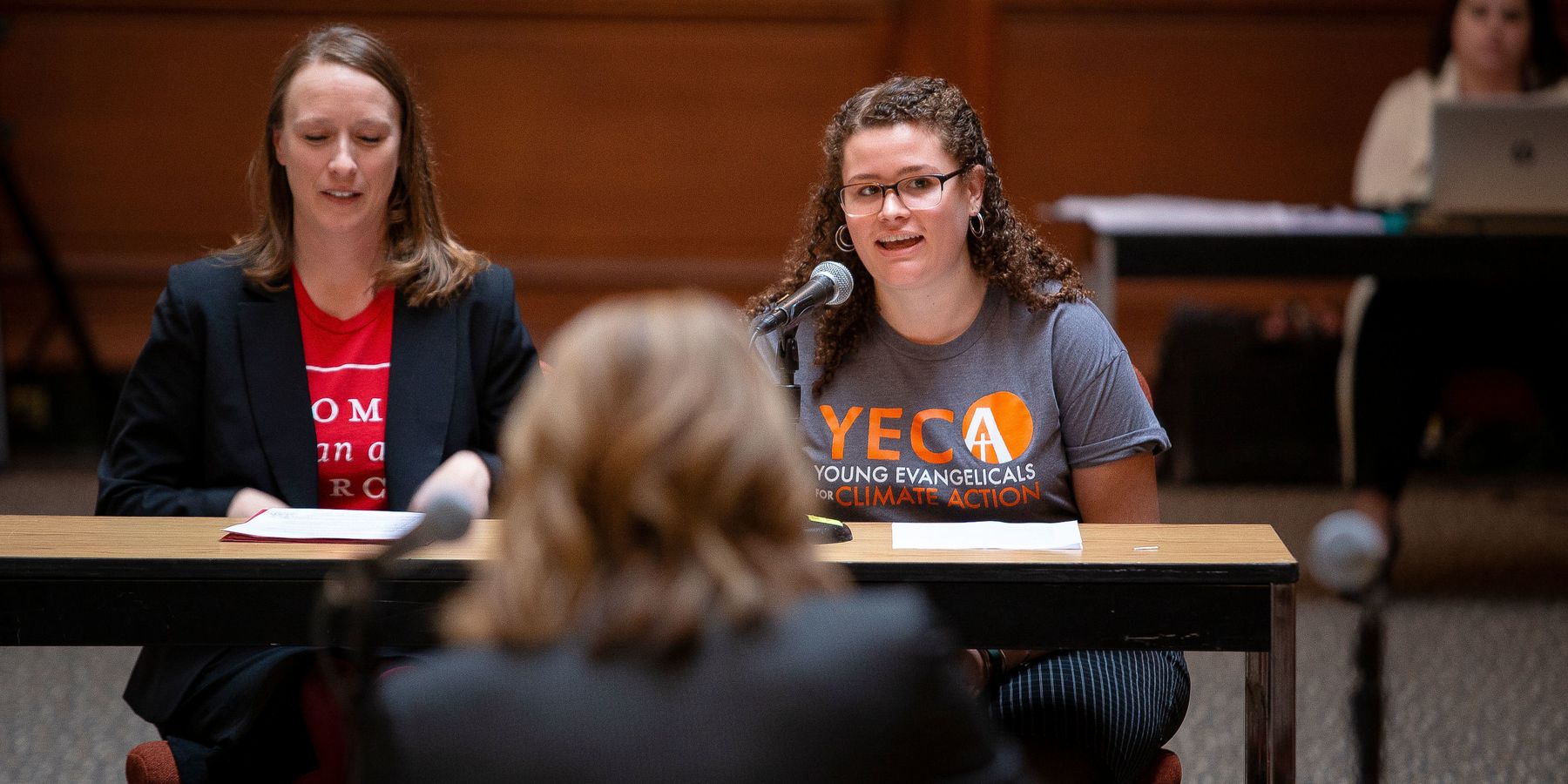
Making toxic-free births a Christian issue
Christian groups fiercely defend the rights of the unborn but have long neglected to advocate for pollution-free births and childhoods. Some evangelicals are trying to change that.
Reverend Mitchell Hescox was on Capitol Hill in February, urging members of the House Oversight and Reform Committee not to gut an air pollution rule that protects children from the brain-damaging chemical mercury.
As president and CEO of the Evangelical Environmental Network (EEN), his message was unique among advocates of the highly-effective 2012 Mercury and Air Toxics Standard (MATS), which has slashed mercury emissions 85 percent from coal-fired power plants.
"Our commitment to Jesus Christ compels us to do all we can to protect unborn children from mercury poisoning. It is a pro-life concern, plain and simple," stated Hescox in his testimony, a seven-paged impassioned plea interweaving scripture with scientific research.
"President Trump's record of destroying environmental health rules threatens every child's right to fulfill their God-given potential," he said.
Coal-fired power plants are a major source of mercury, which gets converted in waterways to methylmercury, a highly toxic form that magnifies up food chains. When ingested by pregnant women, usually in fish, methylmercury crosses the placenta where it can affect the IQ and motor skills of children in utero, among other impacts.
Hescox calls the Environmental Protection Agency's effort to roll back MATS "the most egregious act yet by this EPA to undermine the health and lives of our unborn children."
He spent much of 2011 and 2012 advocating for the rule, which limits the amount of mercury and other air pollutants that may be emitted from power plants, and more recently mobilized 145,000 Christian evangelicals to submit comments against the EPA's proposed rule change. The new rule would eliminate the Obama Administration's justification for the standard, by providing new cost and benefit data that many question. It would not kill the rule outright, but is widely expected to open the door to industry lawsuits that would have that effect.
"I never expected to be fighting this mercury battle again," he told EHN wearily.
The Evangelical Environmental Network is not a member organization, but it has mobilized five million pro-life Christians to submit comments, testify on behalf of, or otherwise support environmental policies since its founding in 1993, according to Hescox. It offers a rare but growing voice that views the biblical call to protect life as a mandate that means caring for the environment, or "all god's creation," as well as protecting life from conception to natural death. It's a "whole life" perspective especially attractive to young evangelicals who view the pro-life stance as weaponized and no longer useful. These conservative Christians want to protect vulnerable populations from environmental pollution, and are drawing the connections between fossil fuels, human health and climate change.
Their movement, however, is butting up against a deeply ingrained pro-life Christian culture that narrowly focuses on ending abortion, and is now intertwined with partisan politics and free-market economics, right up to the highest levels of our federal government.
Can Hescox and others who take the "whole life" perspective convince pro-life politicians and conservative organizations that a consistent ethic of life must protect women and children from environmental pollution?
"We're literally destroying our lives, from increases in breast cancer, to decreasing sperm count in young boys, increases in asthma and autism, all definitively linked to how we use petrochemicals and fossil fuels," Hescox said. "How we care about God's creation impacts the way we think about human life."
“One of the greatest threats to children’s health worldwide”
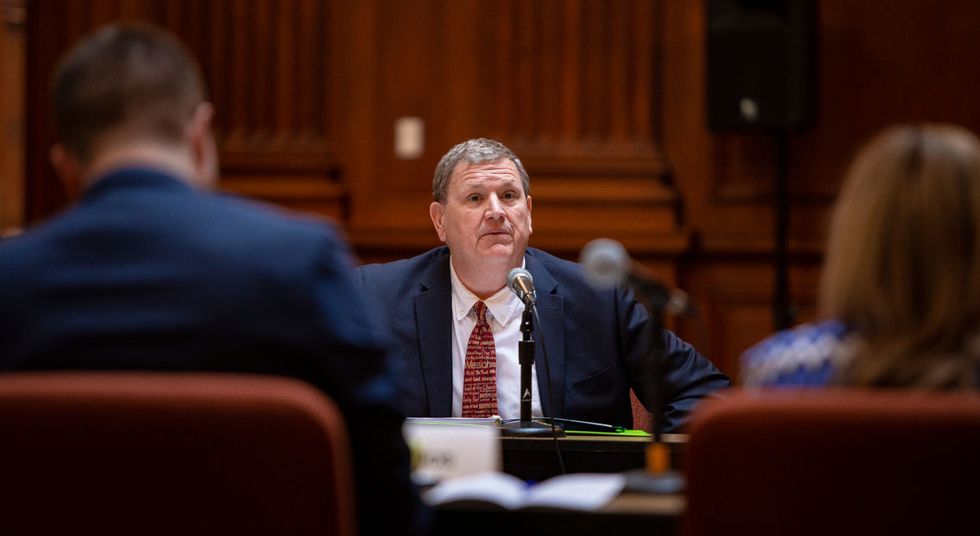
Reverend Mitchell Hescox testifying in support of the Mercury and Air Toxics Rule at the EPA in March 2019.
(Credit: JeffreyGrounds Photography)
Scientists have identified classes of chemicals prevalent in consumer products and the environment that harm children in utero, after they're born, and as they age, even into adulthood.
"The science is very good. It's particularly well documented for brain development and neurobehavioral outcomes," Wendy Heigar-Bernays, a clinical professor in the Department of Environmental Health at Boston University's School of Public Health, told EHN.
Bruce Lanphear, a professor and researcher at the Faculty of Health Science at Simon Fraser University, agrees the science shows that chemical exposures during early brain development "are far more toxic and have lasting impacts." He cited Project TENDR, a group of some 50 researchers who published a groundbreaking 2016 consensus statement in Environmental Health Perspectives identifying chemicals of concern on the developing brain.
"Children in America today are at an unacceptably high risk of developing neurodevelopmental disorders that affect the brain and nervous system..." begins the statement, which identifies organophosphate pesticides, polybrominated diphenyl ether (PBDE) flame retardants, combustion-related air pollutants, lead, mercury, polychlorinated biphenyls, and phthalates as environmental exposures of concern.
"What's so important and powerful about Project TENDR is that most of us in science are trained to be skeptical, and this group of people...agreed that we knew enough about these [pollutants], to know they're toxic to the developing brain and we should do something about it," Lanphear told EHN.
Per- and polyfluoroalkyl substances (PFAS), used widely in nonstick pans, waterproof jackets, carpets and firefighting foam, and increasingly showing up in U.S. water supplies, don't make the list—yet—because we're still learning about their impacts, Lanphear said. Studies thus far show immune system effects occurring in utero, and other effects like low birth weights. Many of the chemicals on the TENDR list similarly increase the risk of children being born too small or too soon, said Lanphear.
There's evidence that babies born very preterm [before 32 weeks' gestation] are at higher risk for adult onset cardiometabolic diseases, such as type 2 Diabetes, coronary heart disease and stroke.
"Anything that affects the pregnancy and actual birth of the baby can have long lasting impacts on the health of the adults," Carmen Messerlian, assistant professor of environmental, reproductive, perinatal and pediatric epidemiology at the Harvard Chan School of Public Health, told EHN.
Even exposures before a baby is conceived can impact its health, added Messerlian, citing
a growing body of literature that identifies male and female exposures—stress, chemical and nutritional—that impact the gametes (eggs and sperm). Those get transmitted through a process called epigenetic modification, and play a critical role in fertilization, implantation and embryo development, she said.
The sum of this evidence has lit a fire under Hescox, who worked in the coal industry for 14 years before "hearing the call," attending seminary, and serving as a pastor for 18 years.
"I've come to understand that pollution is one of the greatest threats to children's health worldwide," he said.
Words vs. action
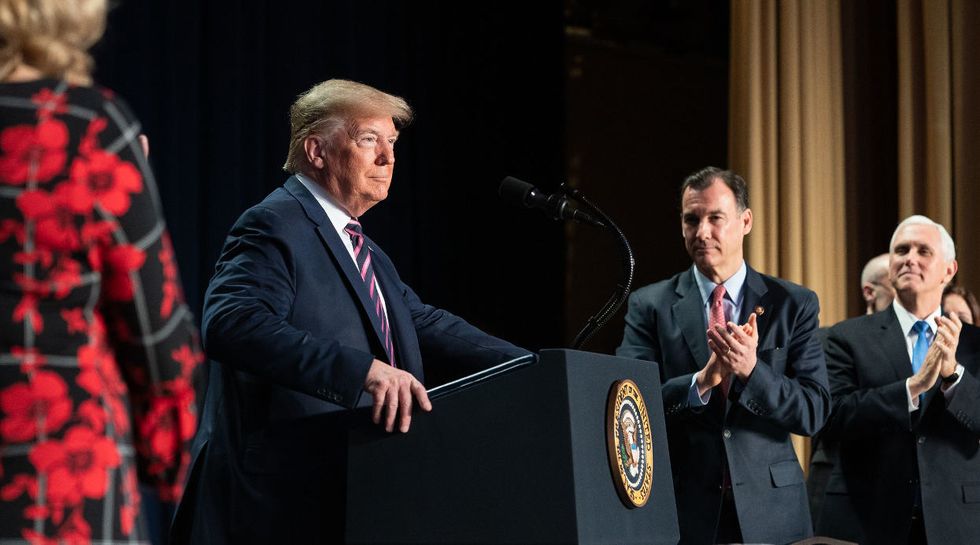
President Trump at the National Prayer Breakfast, February 2020. (Credit: The White House)
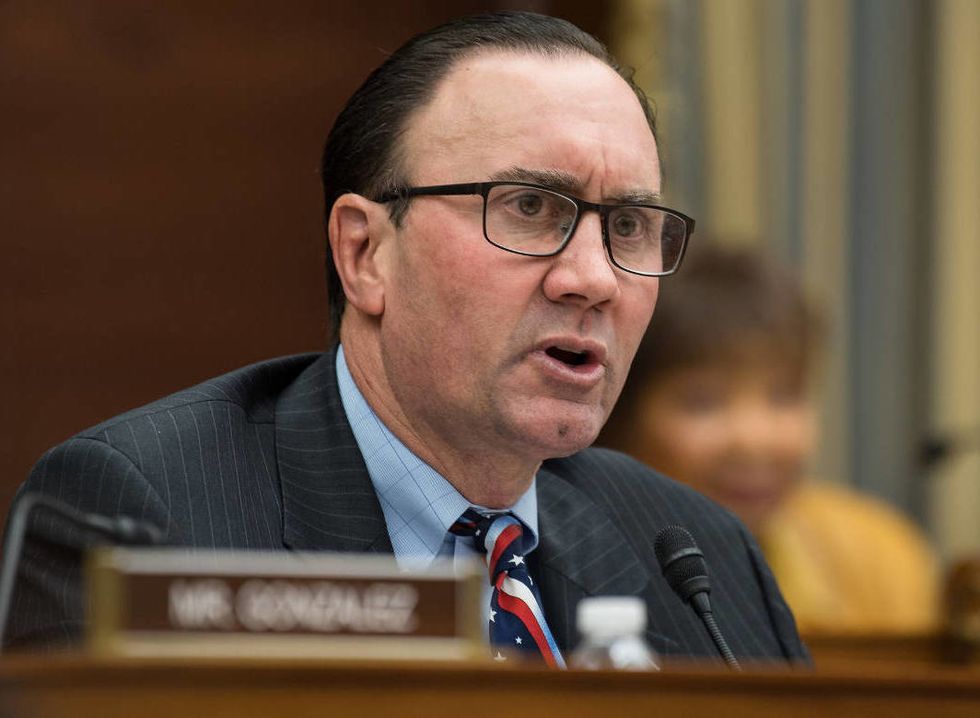
U.S. Rep. Pete Olson (R-Texas) gets an A grade from the pro-life Susan B. Anthony List, a national organization focused on ending abortion. (Credit: NASA)
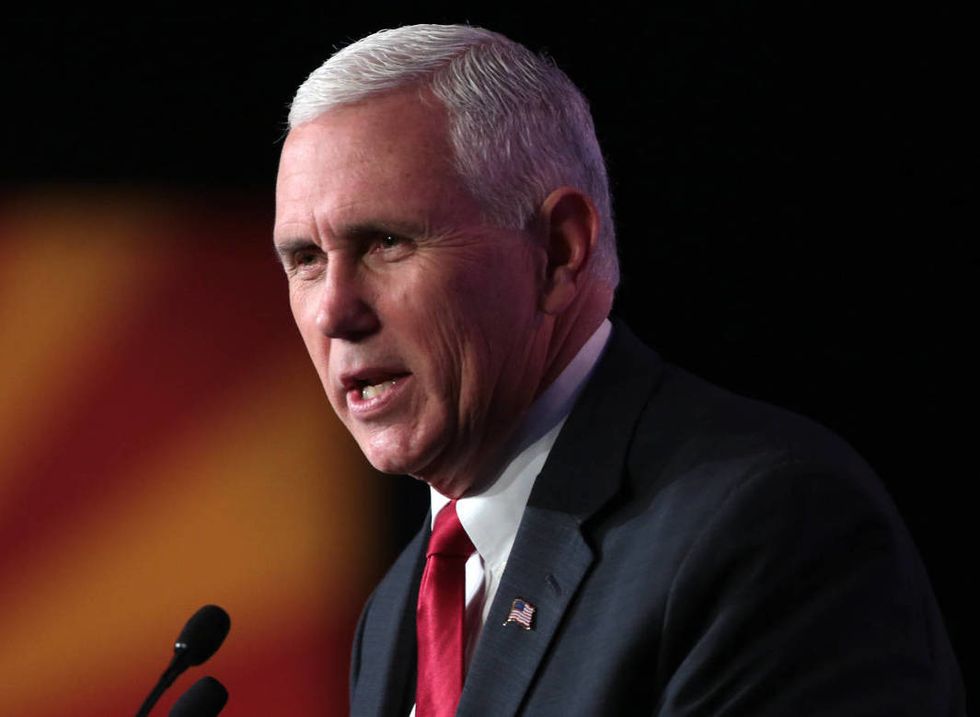
Vice President Mike Pence. (Credit Gage Skidmore/flickr)
The U.S. regulatory system, however, has had a different response. "We don't seem to be able to use our current system to prevent human exposure to these chemicals," said Heigar-Bernays.
Regulatory failure can't be blamed solely on pro-life politicians—but some find it particularly galling when those who profess to care about children in the womb don't act to protect them.
"Time and again, the same folks who end up in the anti-abortion space are the same folks pushing for...removing actual environmental protections, [and] things that are addressing poverty and inequality for working families," Nourbese Flint, policy director, Black Women for Wellness, a reproductive justice organization, told EHN.
President Trump, who enjoys overwhelming support among evangelicals and has repeatedly voiced support for anti-abortion groups, has rolled back an estimated 95 environmental protections, many of which directly impact children. Perhaps most egregious, Trump's EPA refuses to ban chlorpyrifos, a pesticide that causes neurological damage in children and is used on citrus, apples, grapes, wheat, and other crops. Several states and countries have banned it; even the manufacturer plans to discontinue it by 2021. The president has taken these actions with support of Vice President Mike Pence, a long-time born-again evangelical Catholic, and virulently pro-life Republican politician.
This disconnect is frequently on display in Congress as well, where the pro-life issue has become so partisan that zero Republicans in the House and only two in the Senate support abortion rights, while a handful of Democrats are pro-life.
In a particularly cynical moment in January, as lawmakers were debating a bill that would tackle PFAS chemicals, Rep. Cathy McMorris Rodgers (R-WA) took to the floor to oppose the bill unless it added an amendment requiring a PFAS drinking water standard to include unborn children as a vulnerable population. Protections for pregnant women were already included in the bill, H.R. 535.
"[The unborn child] is the most vulnerable population that should be protected," she exhorted. As her side of the aisle erupted in rousing cheers, McMorris Rodgers continued, "By rejecting this amendment you would be denying the science of protecting a child in the womb," and cited the 2004 Unborn Victims of Violence Act recognizing the personhood of an unborn child as precedent for her amendment.
McMorris Rodgers, who declined an interview for this story, voted against H.R. 535, stating on her website: "This legislation would address PFAS clean up in an entirely partisan way. I attempted to amend this legislation on the floor to protect the most vulnerable population—unborn children."
Yet, Heigar-Bernays, Lanphear and Messerlian all concur that the way to protect unborn children from harmful exposure is to set a standard that protects pregnant women, as specified in H.R. 535. Exposure limits should be set for women of child-bearing age, said Messerlian, because even pre-conception exposures to some chemicals have been shown to cause harm.
"Unborn children are not these things that float out in space," said Flint, in agreement. "They're in people's bodies."
H.R. 535 passed the House, only to die in the Senate. President Trump promised a veto.
"The irony of it all is that one of the issues they couldn't agree on was...the extent to which Congress should direct the EPA to take the impacts of PFAS on the developing fetus and mother into account, when establishing a drinking water standard," Scott Faber, senior vice president, government affairs, at the Environmental Working Group, told EHN. Faber noted, however, that 24 Republicans voting for H.R. 535 was unprecedented for an environmental bill and shows that they understand PFAS is dangerous.
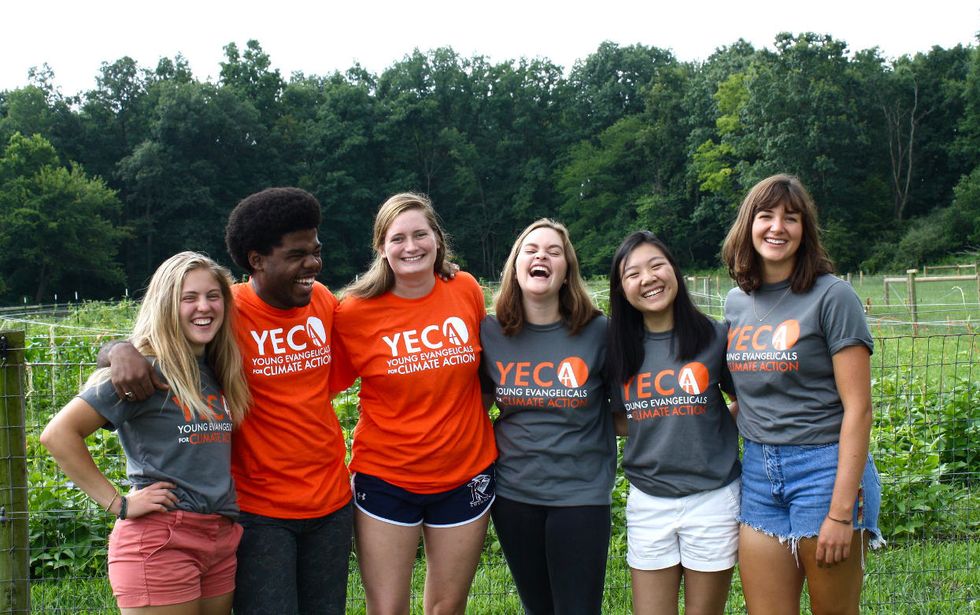
Credit: Young Evangelicals for Climate Action/flickr
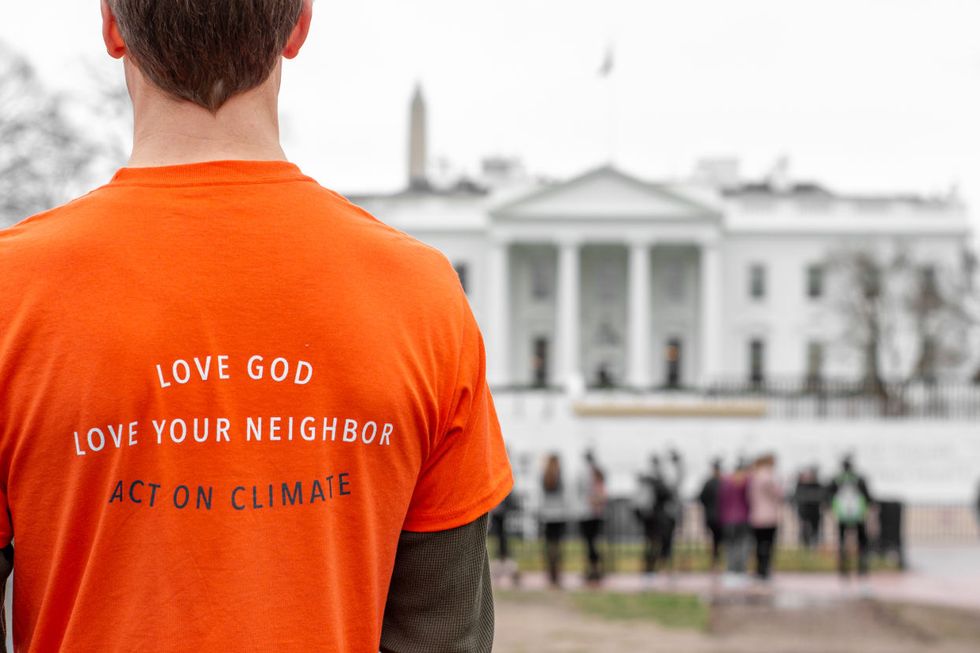
Young Evangelicals protesting climate inaction at the White House. (Credit: Luke Overstreet/lukeoverstreet.com)
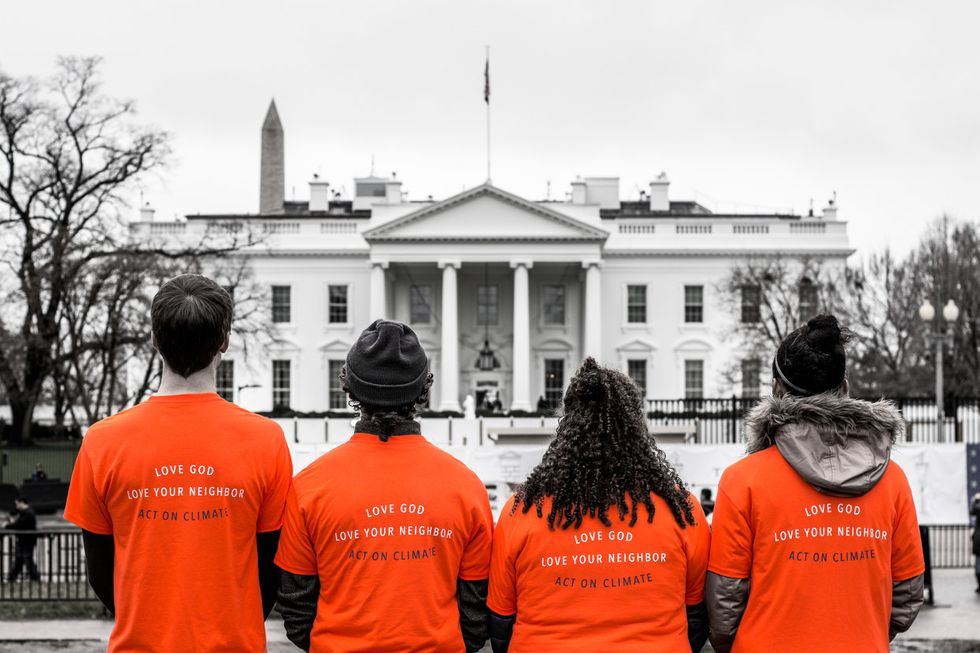
Young Evangelicals protesting climate inaction at the White House. (Credit: Luke Overstreet/lukeoverstreet.com)
Rep. John Shimkus (R-Ill), who wrote the Republican dissent on H.R. 535, is an outspoken pro-life politician, known for his 2012 refrain, "The 'life' in 'pro-life' denotes not the quality of life, but life itself," which was in response to Hescox' advocacy for the MATS rule.
His statement became a rallying cry for pro-life organizations like the Cornwall Alliance, which took the statement one step further, stating: "The [pro-life] term denotes opposition to a procedure that intentionally results in dead babies."
Shimkus came under fire for inconsistent pro-life views in 2017 when he opposed health insurance coverage for contraception, prenatal care, delivery, and newborn care, and questioned why men should pay for prenatal care under the Affordable Care Act.
Among other examples of pro-life politicians' hypocrisy, H.R.230, a bill that would have banned the brain-damaging chlorpyrifos and made up for EPA's reversal on the pesticide never advanced in Congress last year, even with 85 co-sponsors.
The manufacturer DowDupont gave some $379,000 in campaign contributions to representatives who didn't co-sponsor the bill. John Moolenaar (R-MI), who has a 100-percent pro-life record, was the top recipient.
And in 2017, most House Republicans voted for a bill that would have gutted the Clean Air Act by shifting the focus from public health outcomes to economic costs—even though prenatal and early child exposure to air pollutants is associated with neurodevelopmental damage.
The bill's sponsor, Pete Olson (R-TX), has taken in $56,000 in campaign funds from the oil and gas industry and another $27,000 from electric utilities, and gets an A grade from the pro-life Susan B. Anthony List, a national organization focused on ending abortion by passing laws and electing pro-life legislators.
Narrow focus
Policymakers aren't alone in failing to connect their pro-life views with support for policies that protect children in utero from toxic exposures. Many pro-life organizations are narrowly focused on ending abortion, though some are broadening their view on the meaning of pro-life.
The president of the Massachusetts Family Institute, Andrew Beckwith, said that defeating the Massachusetts Roe Act, which would protect abortion rights in Massachusetts should the Supreme Court overturn Roe vs. Wade, "is the main focus of their pro-life efforts this year."
Asked about the organization's view on protecting children from environmental harm, Beckwith said that the "safety and well-being of a child are something we'd be concerned about." But, "we haven't gotten into that specific issue. I haven't been approached about it."
The Personhood Alliance, which advocates for giving fetuses legal rights separate from their mothers, focuses on "any technology that intentionally ends human life, at any stage," said Sarah Quale, president of the Personhood Alliance Education, in an email.
Asked about the impact of toxics on children in the womb, Quale responded, "More must be done to expose the sources of [toxics] and inform the public of their risks and harms, using evidence-based, non-politicized research, so that proper protections can be put in place."
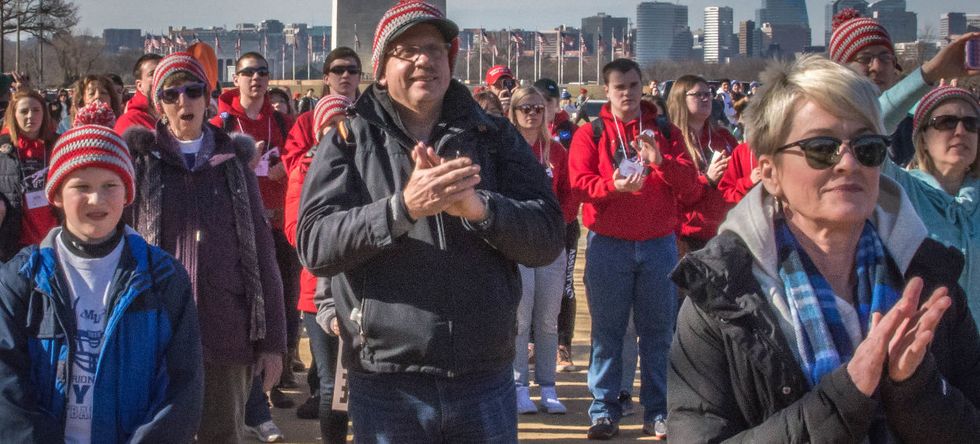
March for Life rally, 2018. (Credit: Philip Cohen/flickr)
Pro-Life Action Ministries education director Debra Braun said in an email that "Pro-Life Action Ministries is opposed to harming the internal environment of unborn children through...chemicals such as mifepristone, misoprostol and digoxin," or drugs used for abortion.
The National Right to Life, Susan B. Anthony List and Focus on the Family, all big donors to national pro-life candidates, declined requests for interviews.
Galen Carey, vice president of government relations at the National Association of Evangelicals, sees the influence of free market economics on some pro-life organizations with a narrow viewpoint. "Some people in some groups take a more libertarian approach, so they don't see a big role for government."
Melody Zhang, a member of the EEN affiliate, Young Evangelicals for Climate Action, also sees partisan politics at play, and observes conservative legislators operating in two separate worlds.
"In their personal lives, they're...good at loving their neighbor, and seeking out opportunities to volunteer. Yet in the public sphere they enact policies that have violent effects on peoples' health and well-being because of their allegiance to specific party ideology rather than an allegiance to Jesus," she told EHN.
But Zhang also said that for some Christians it's a narrower theology. "Evangelicals focus so much on saving people's souls rather than protecting the soul's body in the here and now," she said.
“A consistent ethic of life”
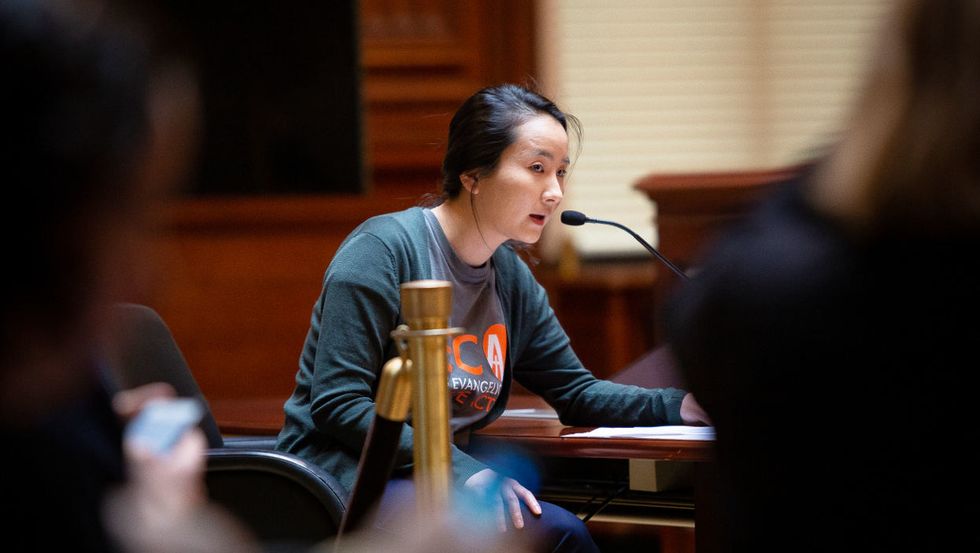
Melody Zhang, a member of the Young Evangelicals for Climate Action (affiliate of the Evangelical Environmental Network) testifying in support of the Mercury and Air Toxics Rule at the EPA in March 2019. (Credit: JeffreyGrounds Photography)
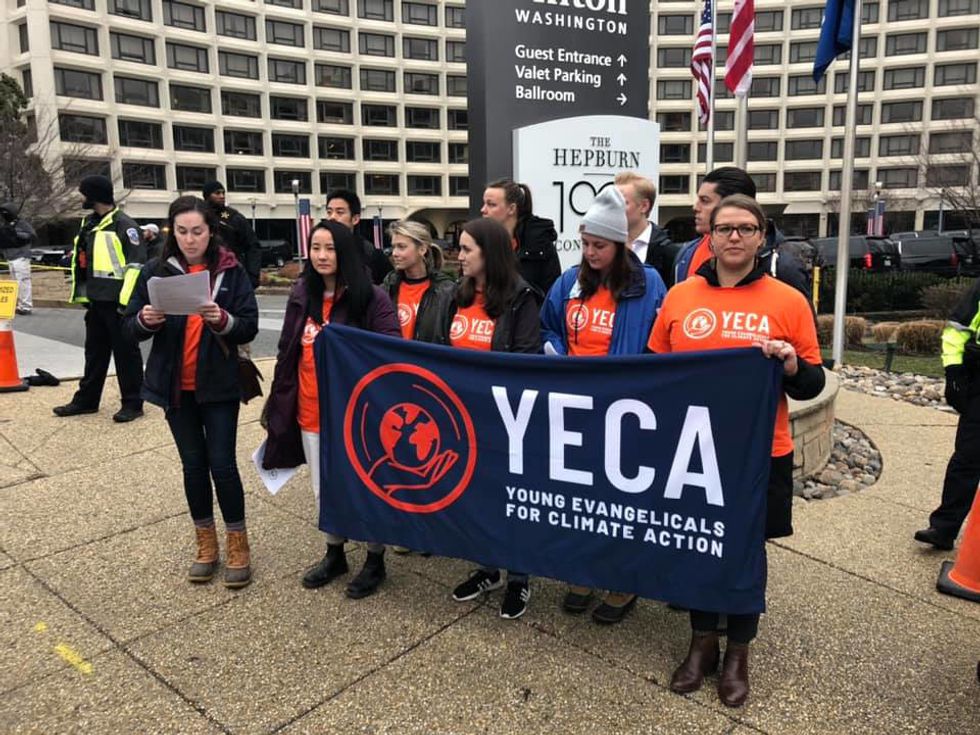
Melody Zhang demonstrates with Young Evangelicals for Climate Action. (Photo Credit: Kyle Meyaard-Schaap)
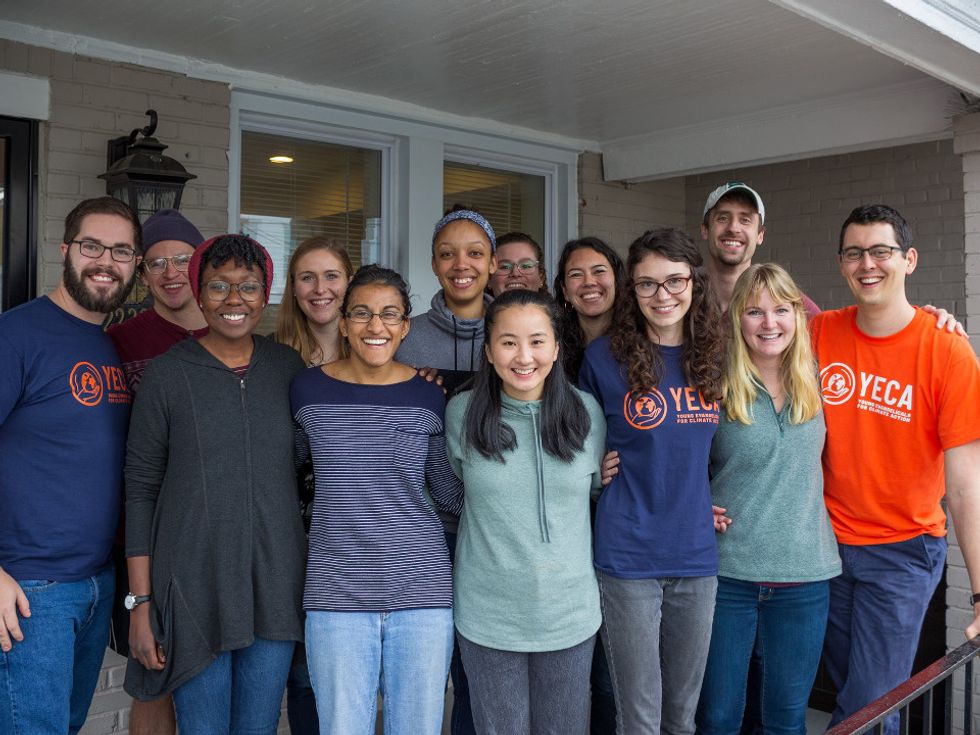
Melody Zhang serves as chair of the Steering Committee for Young Evangelicals for Climate Action, a group that aims to take action on the climate crisis as part of their Christian discipleship and witness. (Photo Credit: Luke Overstreet)
Such single-minded focus frustrates Hescox, who said younger Christians want to focus on "life in its totality."
"Rightfully so, a lot of evangelicals have been chastised for being concerned about children before they're born, but what about after they're born." But, he said, "That's finally started to sink in across the movement."
The National Association of Evangelicals (NAE), which represents 40 denominations and 45,000 congregations, generally aligns with EEN, though its members hold widely divergent views.
"Among our leaders, they're pretty united...[but] there's plenty of disagreement, especially at the local level. In any one church you'll find a range of views," Carey said.
NAE published "Loving the Least of These," which addresses a changing environment and the impact on the poor. It's gearing up, along with EEN, for a day of prayer on Capitol Hill in May that will have a focus on climate change. (Update: This day of prayer has been postponed until September due to coronavirus)
"We have the 50th anniversary of Earth Day and EPA coming up. We did come together as a nation and say clean air, clean water, and health are important for all of our people and there is more work to be done," said Carey.
The U.S. Conference of Catholic Bishops holds similar views to NAE and is a member of the National Religious Partnership for the Environment (NRPE), along with EEN, the National Council of Churches of Christ, and the Jewish Council for Public Affairs.
NRPE's four partner organizations "… don't always agree on everything," its executive director Cassandra Carmicheal, told EHN, "but they have come together for almost 30 years now with the firm understanding and commitment that they need to care from a faith perspective for god's creation. And that includes vulnerable populations."
"Limiting exposure to toxic chemicals and pollution is something the Catholic Church has been engaged in, pretty extensively with the EEN," using a pro-life approach, said Carmichael. The U.S. Conference of Catholic Bishops in particular has urged Congress to keep the MATS rule intact.
"A consistent ethic of life will certainly encompass issues such as water pollution and the need for safe drinking water, said Jason Adkins, executive director, Minnesota Catholic Conference, in an email, pointing to the Catholic Church's clean water advocacy work in Minnesota.
But, Adkins said, "When we talk about what it means to be pro-life, it means primarily a dedication to combating legal forms of unjust killing, particularly through abortion and euthanasia."
Youth leading the change
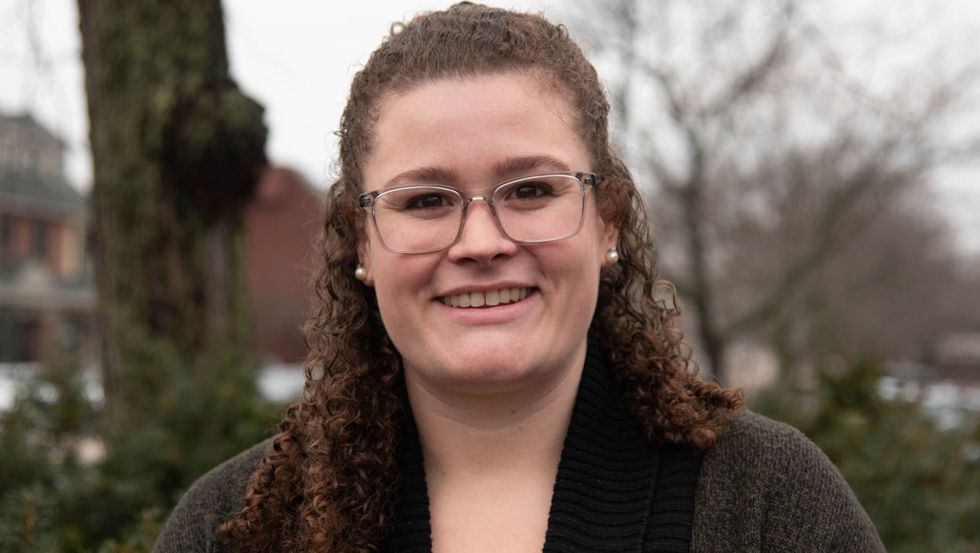
Victoria Goebel, communications director for the Evangelical Environmental Network, is one of a growing number of young evangelicals who share a whole life perspective. (Credit: Meg Wilcox)
Zhang, who grew up in Rochester Hills, Michigan, and attended an evangelical Christian church in Detroit told EHN, "I don't use the term pro-life and pro-choice. I think that it's weaponized and it's not actually a helpful term anymore.
Zhang studied environmental studies at the University of Michigan, and as a student organizer on the Flint water crisis, was awakened to environmental justice. She heard her classmates talk about their parents, who were "being affected every day, needing to bathe and cook with water bottles."
"I was living two separate lives in a way," she said. "I was going to church and participating in ministry, but also at the same time working on the Flint water crisis and having this real education...I was interested in why people at church weren't talking about real issues that were happening."
Her experience is not unusual, she said. "I haven't met a Christian who is in college or graduated who still thinks the same, and has the same pro-life conviction, as their parents do."
Similarly, Victoria Goebel, communications director at EEN, said that a class in energy and the environment at Gordon College was her awakening. Goebel, who "grew up in a wonderful Christian home, fairly conservative," said it was the first time she learned about the climate crisis from a scientific and religious perspective, and like Zhang, initially felt "a tension" between her faith and what she was learning.
Like Zhang, Goebel said, "I'm pro-life in the sense that the NAE defines it...that all life has value, we have to care about life not just in the womb, because air pollution and the climate crisis, this impacts everyone, babies, young children, adults, vulnerable populations. We think of it as a whole life perspective."
Goebel is educating her parents now, as they've taken an interest in her work.
Young evangelicals like Goebel and Zang are leading change within their families and churches, but Hescox said that he sees shifting attitudes in every congregation he visits.
"People are starting to ask questions about why things are happening to them, and seeking answers even from the most conservative viewpoints. People in our churches are wondering why their mother, sister, brother is dying of cancer...why are they getting all these auto-immune diseases? Why the extreme weather is flooding their farms. Those eye-opening moments are becoming very teachable for us," said Hescox.
As for politicians catching up, he said, "They will. They're going to have to."
Banner photo: Victoria Goebel (right), a member of Young Evangelicals for Climate Action, testifying in support of the Mercury and Air Toxics Rule at the EPA in March 2019. (Credit: JeffreyGrounds Photography)


